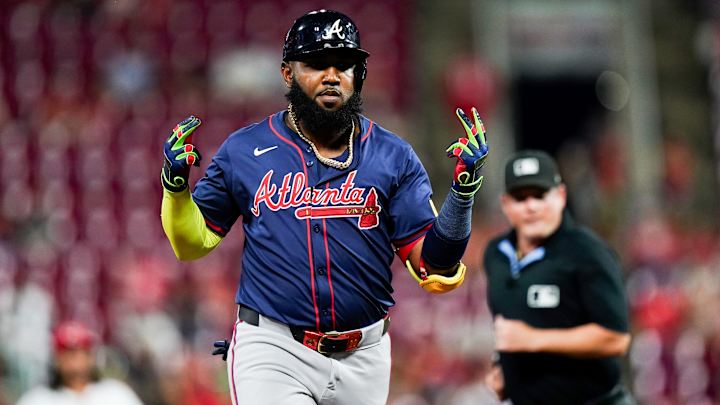The Atlanta Braves have made headlines with their strategic decisions regarding key player contracts, particularly focusing on Marcell Ozuna and Travis d’Arnaud. These choices reflect a blend of financial acumen and a commitment to maintaining competitiveness in a highly competitive NL East.
### Marcell Ozuna: Evaluating Performance and Potential
Marcell Ozuna’s tenure with the Braves has been a rollercoaster, marked by moments of brilliance and challenges both on and off the field. His contract has sparked considerable debate among fans and analysts alike. On one hand, Ozuna has demonstrated his ability to be a game-changing hitter, capable of producing runs and providing power in the middle of the lineup. His 2020 season, which included a league-leading 18 home runs and a .338 batting average, showcased his offensive prowess.
However, his performance has been inconsistent, and off-field issues, including a legal situation in 2021, raised questions about his future with the team. The Braves made the logical decision to restructure Ozuna’s contract rather than part ways entirely. By doing so, they retained a player who has the potential to contribute significantly while also alleviating some financial burden. This strategy allows the Braves to maintain depth in their lineup while minimizing risk, should Ozuna fail to return to form.
### Travis d’Arnaud: Stability Behind the Plate
Travis d’Arnaud’s role as a catcher has been crucial for the Braves, both for his defensive skills and his leadership qualities. His ability to manage a pitching staff effectively cannot be overstated; the Braves’ pitchers often cite d’Arnaud’s game-calling ability as a key factor in their performance. Furthermore, d’Arnaud has proven to be a reliable offensive contributor, especially in clutch situations.
In re-signing d’Arnaud, the Braves secured a veteran presence behind the plate that brings stability to a position often fraught with uncertainty. His contract extension reflects a commitment not just to his on-field abilities but also to the culture he fosters within the team. With young pitchers emerging, having a seasoned catcher like d’Arnaud is invaluable. This decision aligns with the Braves’ long-term strategy of developing talent while ensuring they have reliable veterans to guide them.
### Financial Considerations: Balancing Risk and Reward
The Braves’ front office is known for its analytical approach to player contracts. By evaluating performance metrics and the overall impact of each player, they aim to make decisions that not only reflect current realities but also future potential. The financial implications of Ozuna’s and d’Arnaud’s contracts were carefully weighed against their expected contributions.
For Ozuna, the Braves seem willing to gamble on a bounce-back season, especially considering the potential upside of his offensive capabilities. The financial reworking of his deal indicates a belief that he can return to his previous form, which could significantly enhance the team’s batting lineup. Conversely, the commitment to d’Arnaud demonstrates a focus on stability and leadership—elements that are critical in a sport often dictated by the unpredictable nature of player performance.
### The Bigger Picture: Aiming for Sustained Success
The Braves are not just thinking about the immediate future but also about sustainable success. Their decisions regarding Ozuna and d’Arnaud reflect an understanding of the importance of balancing short-term gains with long-term strategy. In a division that includes formidable competitors like the New York Mets and Philadelphia Phillies, maintaining a competitive edge is essential.
By restructuring Ozuna’s contract and extending d’Arnaud’s, the Braves have taken a calculated approach that allows them to remain flexible while also retaining talent that can contribute to their playoff aspirations. This dual strategy of risk and stability is indicative of a franchise that is serious about contending for championships.
### Conclusion
The Braves’ decisions regarding Marcell Ozuna and Travis d’Arnaud exemplify a logical and strategic approach to player contracts. By weighing performance, potential, and financial implications, the organization demonstrates a commitment to both present success and future sustainability. As the Braves aim for continued competitiveness in the coming seasons, these decisions will play a pivotal role in shaping their roster and overall team dynamics


